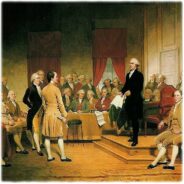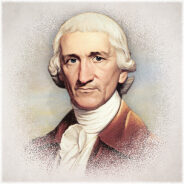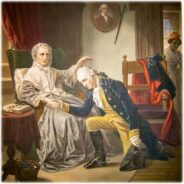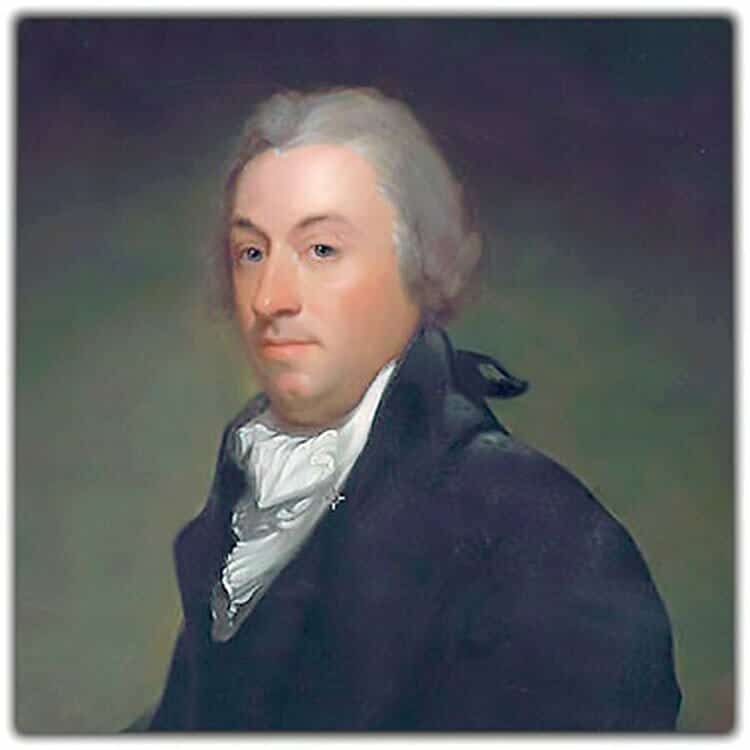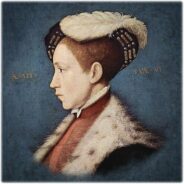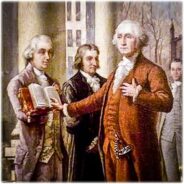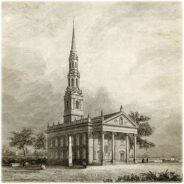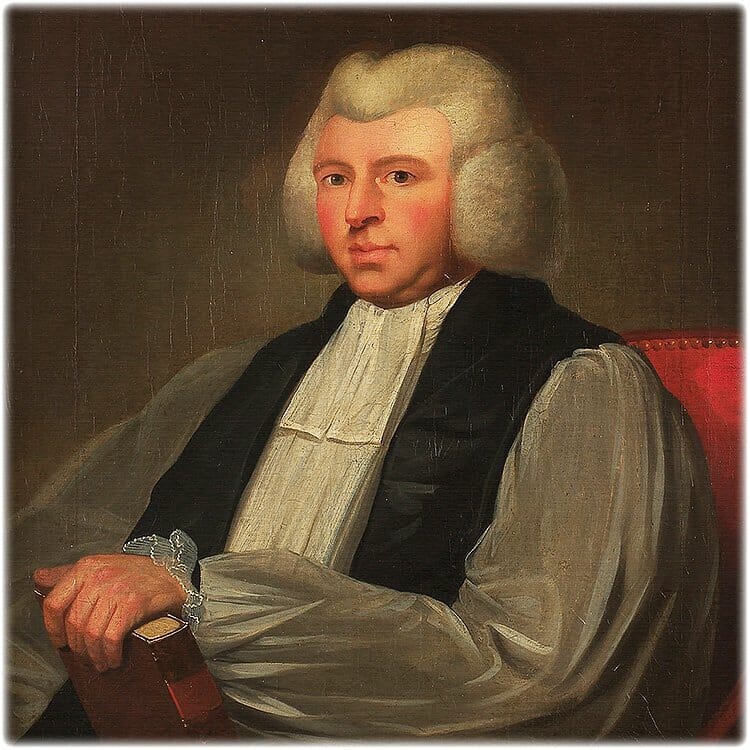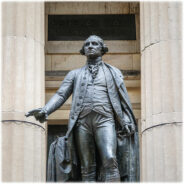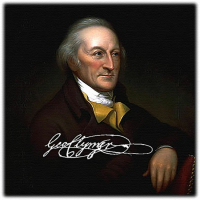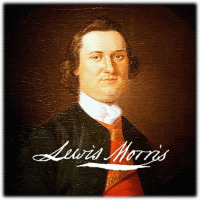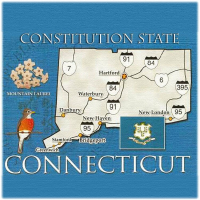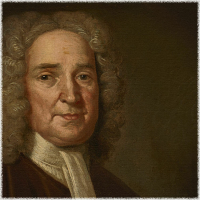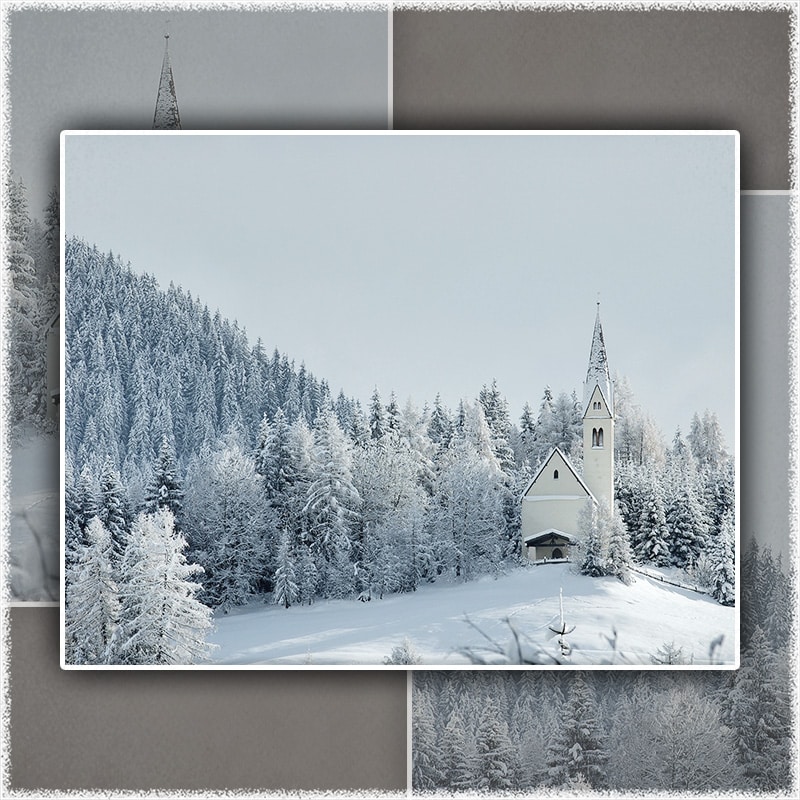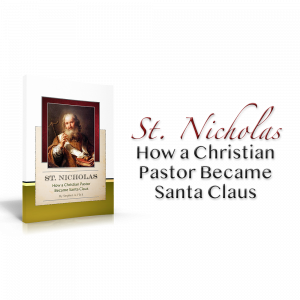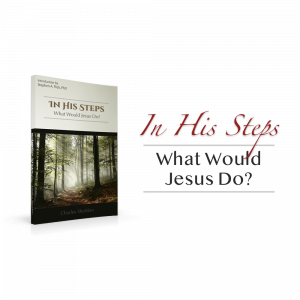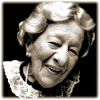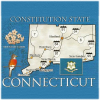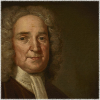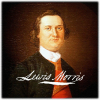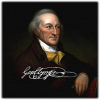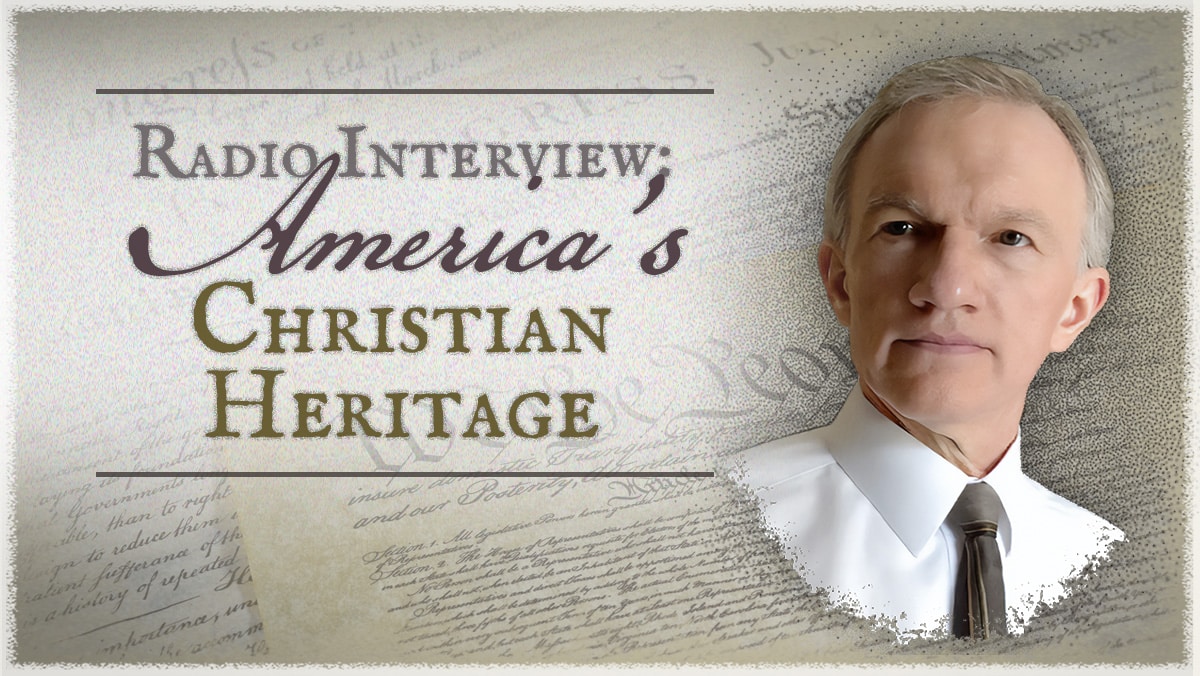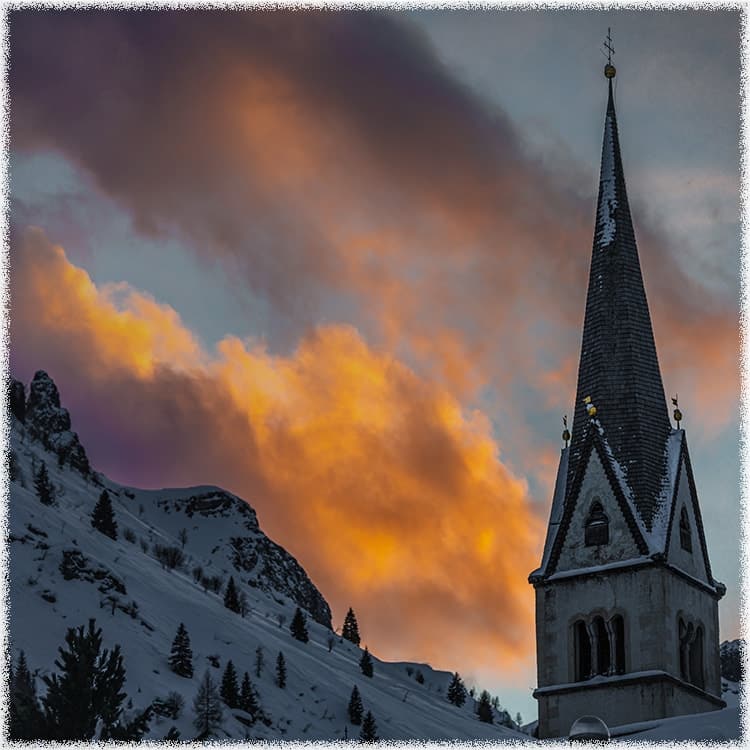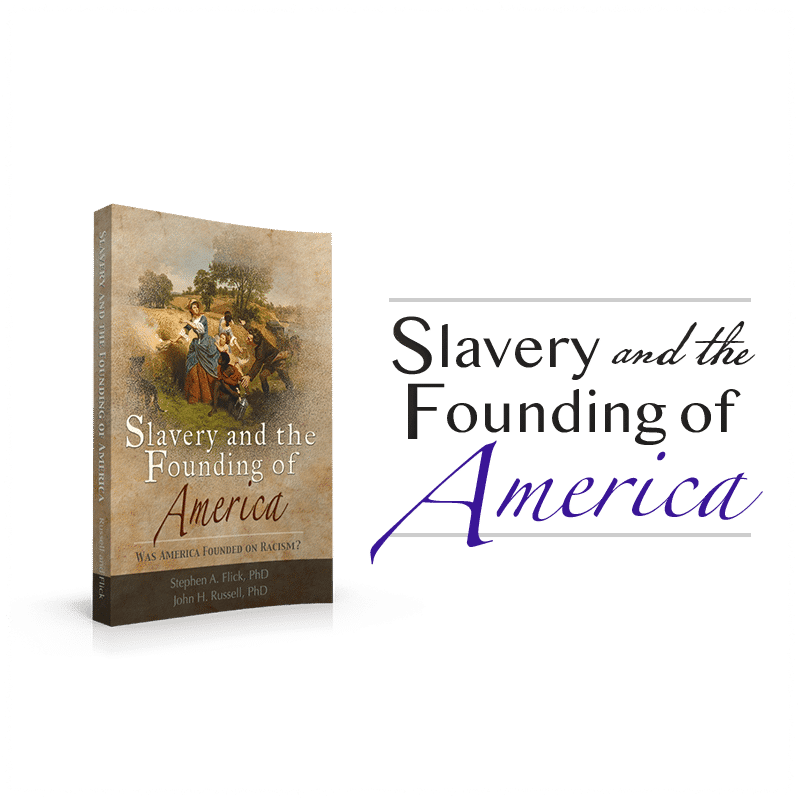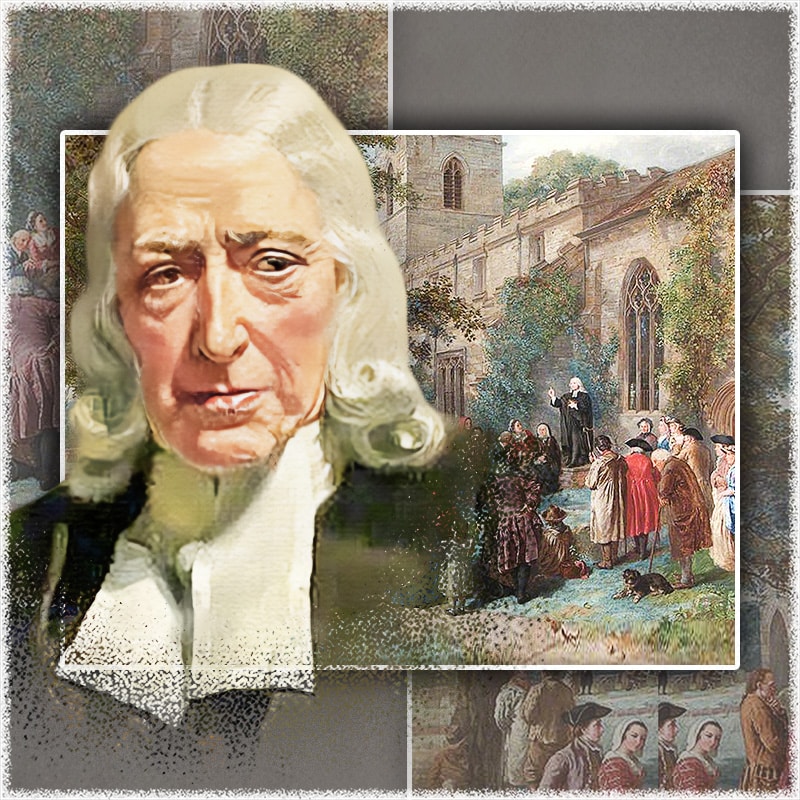Christianity in America’s First Presidential Inauguration
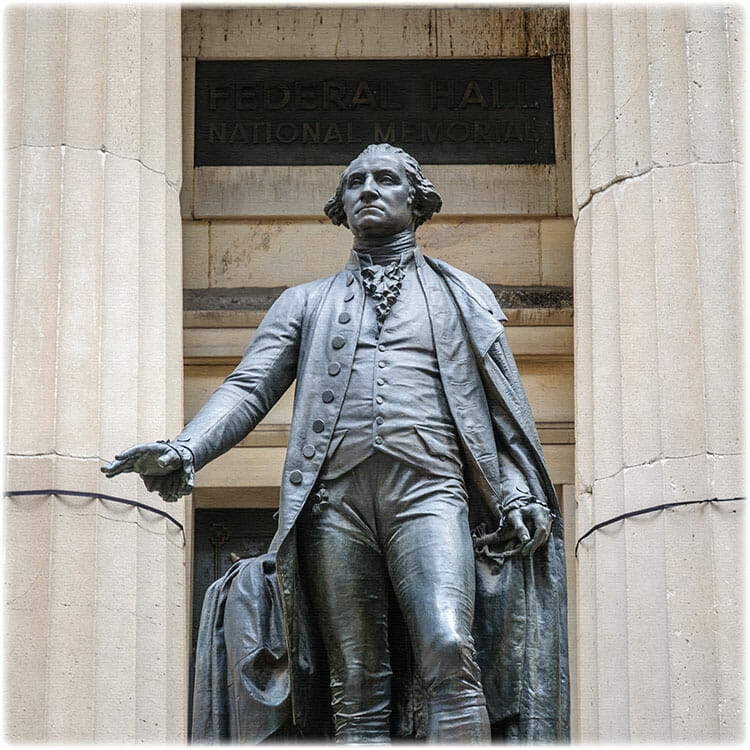
There is no evidence to support the notion of atheists, agnostics, secularists, and the irreligious that America was founded upon secular principles. Just the opposite is true! In fact, thousands of pieces of evidence exist that affirms the fact that America was founded by Christians upon the principles of the Bible. Rewriting America's history and inundating the public with misinformation have been the weapons of choice for those seeking to place America under the tyrannical heel of atheism and irreligion.America's First Presidential Inauguration
Among the thousands of pieces of evidence that demonstrate America's Christian origin is the first presidential inauguration of George Washington, officiated April 30, 1789. The events chronicled in the following paragraphs will convince the most judicious and candid readers of the Christian intent of American's Founding Fathers. Given the fact that they were so forthright with regard to their Christian faith in one of the most important moments of American political life, there can be no doubt of their commitment in other areas as well—including both state and federal levels.America's First Presidential Inauguration
Article Contents
Following the Revolutionary War, the American states were loosely held together by the Articles of Confederation, but government under the Articles left much to be desired. As a result, a convention was called to revise the Articles of Confederation, but some of the delegates to the convention were resolved to set aside the Articles and completely compose a new government among the states. What emerged was the Constitutional Convention, which convened in Philadelphia, Pennsylvania from May 25 to September 17, 1787. The United States Constitution, which was drafted at the Convention, was then presented to the Confederation Congress (which succeeded the Second Continental Congress) and was forwarded to the states for ratification. By June 1788, enough states (nine were required) had ratified the Constitution to allow it to take effect. On September 12, 1788, the Confederation Congress began to implement the Constitution, setting the date for choosing the new Electors of the Electoral College on January 7, 1789. The Confederation Congress then set the date for the Electors to elect a president on February 4, 1789, and March 4, 1789 was the date set for the Constitution to become fully operative—including the inauguration of the newly selected president.[1]
The timetable established by the Confederation Congress to implement the United States' Constitution, however, could not be met. Though some members of the House of Representatives and Senate convened on this date (March 4, 1789), a quorum could not be established. Not until nearly a month later—on April 1—was the House of Representatives able to achieve a quorum. On April 6, the Senate achieved a quorum for the first time. That day the House and Senate met in joint session and the electoral votes were counted—certifying George Washington and John Adams as president and vice president respectively.
On April 14, Washington received official notification of his unanimous election by the Electoral College to be the nation's first president. Two days later, Washington set off for New York City where Congress was convened, accompanied by David Humphreys and Charles Thomson, who had been the messenger of the Senate and secretary since the First Continental Congress.[2] Thomson had held the office of secretary of the Congress from the inception of the Continental Congress to the formation of the new government under the Constitution (1774-1789). Given the fact that nearly half of the Signers of the Declaration of Independence had degrees from academic institutions founded for the sake of educating ministers, it is no surprise that Charles Thomson, the Secretary of Congress, would also be a Bible scholar. In addition to his political contributions to national independence, Thomson was well-known for his “Thompson Bible,” the first American translation of the Greek Old Testament, as well as theological works such as A Regular History of the Conception, Birth, Doctrine, Miracles, Death, Resurrection, and Ascension of Jesus Christ.[3]
Washington's first stop in route to New York City and the presidency was at his mother's in Fredericksburg, Virginia. This was the last time that each was to see each other. Assuring his mother he would return as quickly as opportunity allowed, Mary Washington responded, "You will see me no more; my great age and disease which is rapidly approaching my vitals warn me that I shall not be long in this world." Then extending her hand toward her son from the armchair where she sat, she bestowed her blessing upon him and offered him her prayers, saying, "Go, George; fulfill the high destinies which Heaven appears to assign to you; go my son, and may that Heaven's and your mother's blessing be with you always." Deeply moved by the somber conversation, Washington stooped to kiss his mother one last time, then bid her farewell, to see her no more.[4] Only a few months passed following this stirring moment between mother and son before Mary Washington succumbed to death from incurable breast cancer. She died in August that year at the age of eighty-two.
Leaving his mother behind, Washington was greeted in town after town with special dinners and celebrations in his honor. Upon reaching Elizabethtown Point, New Jersey, Washington was met by a committee composed of representatives from both the Senate and House of Representatives,[5] as well as civil and military officers. They had prepared and lavishly decorated a boat to take him on to New York City, where upon entering the harbor, he was greeted with ships and smaller vessels all decorated for the special festivities.[6]
Upon landing about three in the afternoon in New York City, Washington was taken to the home prepared for him by Congress in anticipation of his inauguration.[7] That Christian religious acts were planned for America's first presidential inauguration was noticed in local newspapers which reported the scheduled activities:
[O]n the morning of the day on which our illustrious President will be invested with his office, the bells will ring at nine o’clock, when the people may go up to the house of God and in a solemn manner commit the new government, with its important train of consequences, to the holy protection and blessing of the Most high. An early hour is prudently fixed for this peculiar act of devotion and . . . is designed wholly for prayer.[8]
Indeed, the inauguration that followed was replete with a number of Christian observances!
Forced to alter plans for the inauguration of the first President, Congress selected April 30, 1789 for the presidential inauguration. For the first two sessions (March 4, 1789—August 12, 1790),[9] Congress met in New York City at Federal Hall, and it was here on the balcony of Federal Hall (then known as old City Hall) that the inauguration of George Washington was planned. The details of the ceremonies for the President and Vice President had been discussed and planned by both the newly seated Senate and the House of Representatives.[10]
The president elect was dressed for the occasion in a dark brown suit and white stockings, with his hair powdered and dressed in the fashion of the day.[11] The Journal of the Senate described the opening events. About noon, members of the House of Representatives were formally invited to the Senate Chamber where they took the seats provided for them. The joint committee of selected Senators and Representatives formally introduced Mr. Washington to the Senate Chamber where he was received by Vice President John Adams, who in turn, escorted him to the Chair of the Senate. At which time, Vice President Adams ceremonially informed Washington that the Senate and House of Representatives were ready to attend him in taking the oath which the Constitution required, and that it was to be administered by the Chancellor of the state of New York, Robert Livingston—who had been one of the members of the Committee of Five that drafted the Declaration of Independence.[12] Washington acknowledged he was prepared to take the oath of office, and together with Senators, Representative, and other officials, processed to the balcony immediately outside the Senate Chamber.
While the act of taking an oath with one hand placed upon the Bible is now commonplace, it was not always so. In fact, its origin—though not with complete parallel—has profound historical and religious significance. Its origin may be traced to the coronation of the successor of Henry VIII, his son Edward VI, as noted in the following account:
The piety of the youthful monarch [Edward VI] was manifested at the coronation. Bale relates, upon the authority of credible witnesses, that when three swords were brought to be carried in the procession, as emblematical of his three kingdoms, the king said there was one yet wanting. The nobles inquiring what it was, he answered, "The Bible," adding, "That book is the sword of the Spirit, and to be preferred before these swords. That ought in all right to govern us, who use them for the people's safety by God's appointment. Without that sword we are nothing, we can do nothing, we have no power. From that we are what we are this day. From that we receive whatsoever it is that we at present do assume. He that rules without it, is not to be called God's minister, or a king. Under that we ought to live, to fight, to govern the people, and to perform all our affairs. From that alone we obtain all power, virtue, grace, salvation, and whatsoever we have of divine strength." When the pious young king had thus expressed himself, he commanded the Bible to be brought with the greatest reverence, and carried before him.[13]
While Congress had provided for most of the details of the inauguration, it had failed to obtain a Bible for the ceremony. To remedy the matter, Parade Marshal Jacob Morton hurried to the nearby St. John's Masonic Lodge to secure its large 1767 King James Bible. As Chancellor Robert Livingston prepared to administer the oath of office, the Bible was hastily opened to the book of Genesis and laid on a crimson velvet cushion held by Samuel Otis, Secretary of the Senate. Below the balcony, a large crowd had gathered to watch the ceremony. Raising his right hand, Washington placed his left hand upon the open Bible and proceeded to take the oath of office as directed by Chancellor Livingston and prescribed by the Constitution. He then bent over, kissed the Bible, closed his eyes, and reverently said, "So help me God!" Chancellor Livingston exclaimed, "It is done!" and then turned to the on-looking crowd and shouted, "Long live George Washington, the first President of the United States!" The crowd took up the chant, echoing it over and over.[14]
Critics of America's Christian heritage deny the influence that Christianity exercised over the formation of the nation and also seek to deny that Christianity (or religion in general) should have any place in government. However, the role that Christianity should exercise upon government was very clear in the minds of America's Founding Fathers. An example of this may be found in President Washington himself, when in 1796—after two terms in office—he said goodbye to the nation as President in his Farewell Address. One of the subjects he addressed was the importance of Christianity's influence upon public life:
Of all the dispositions and habits which lead to political prosperity, religion [Christianity] and morality are indispensable supports. In vain would that man claim the tribute of patriotism, who should labor to subvert these great pillars of human happiness, these firmest props of the duties of men and citizens. The mere politician, equally with the pious man, ought to respect and to cherish them. A volume could not trace all their connections with private and public felicity. Let it simply be asked: Where is the security for property, for reputation, for life, if the sense of religious obligation desert the oaths which are the instruments of investigation in courts of justice? And let us with caution indulge the supposition that morality can be maintained without religion [Christianity].[15]
Christianity in the First Inaugural Address
Following the oath of office and Washington's display of affection for the Bible, the President, members of the House and Senate, and other officials returned to the Senate Chamber of Federal Hall where Washington delivered his First Inaugural Address. In it, Washington expressed his belief in the "providence" of God, or the guiding hand of God in the development of America as an independent nation. The fact that the Founding Fathers appealed in both state documents and private writings to divine providence, or the influence of God in human affairs, clearly proves they were not deists or atheists! Like the Bible, Washington employed more than fifty different expressions to refer to the God of the Bible—and other Founding Fathers employed similar expressions. In his Inaugural Address, Washington praised God for His influence in allowing America to become an independent nation:
…in this first official act, my fervent supplications to that Almighty Being who rules over the universe—who presides in the councils of nations—and whose providential aids can supply every human defect, that his benediction may consecrate to the liberties and happiness of the people of the United States, a government instituted by themselves for these essential purposes: and may enable every instrument employed in its administration to execute with success, the functions allotted to his charge. In tendering this homage to the Great Author of every public and private good, I assure myself that it expresses your sentiments not less than my own; nor those of my fellow citizens at large, less than either. No people can be bound to acknowledge and adore the invisible hand, which conducts the affairs of men, more than the people of the United States. Every step by which they have advanced to the character of an independent nation, seems to have been distinguished by some token of providential agency; and in the important revolution just accomplished in the system of their united government the tranquil deliberations and voluntary consent of so many distinct communities, from which the event has resulted, cannot be compared with the means by which most governments have been established, without some return of pious gratitude, along with an humble anticipation of the future blessings which the past seem to presage. These reflections, arising out of the present crisis, have forced themselves too strongly on my mind to be suppressed. You will join with me, I trust, in thinking, that there are none, under the influence of which, the proceedings of a new and free government can more auspiciously commence.[16]
Following the delivery of Washington's Inaugural Address in the Senate Chamber of Federal Hall, the President and Congress left Federal Hall and processed through the streets of New York City to attend church together. Three days before the inauguration of George Washington, the Senate and House discussed and agreed to attend church together following the inauguration, though final details were not resolved until the day prior to the inauguration. The selection of Saint Paul's Episcopal Chapel, very likely, was made with consideration to Washington's own Christian denominational affiliation. The Senate initiated the effort,
...for the attendance of both Houses, with the President of the United States, after the oath shall be administered to him, to hear divine service at Saint Paul's Chapel...[17]
The day before the inauguration, the House of Representatives took up the request from the Senate and offered slight revision, as was stated in the final resolution, providing more specific details in their request:
That after the oath shall have been administered to the President, the Vice-President and members of the Senate, the Speaker and members of the House of Representatives, will accompany him to Saint Paul's Chapel to hear divine service performed by the Chaplains of Congress.[18]
Arriving at Saint Paul's Chapel, President Washington, members of Congress, and other guests were led in "divine service" by the chaplain of the Senate, Rev.Dr. Samuel Provoost. On April 26, only a few days prior to the inauguration, the Senate had appointed Rev.Dr. Samuel Provoost (1742-1815) as chaplain of the Senate. Rev.Provoost had been consecrated as Episcopal bishop of New York in 1787 at the same time as Bishop William White, an early chaplain to the Continental Congress. Several years earlier (1785), Provoost had been made a chaplain to the Confederation Congress (successor to the Continental Congress). The inaugural worship service was performed according to the Episcopal Book of Common Prayer, including select prayers taken from Psalms 144-150, readings from the book of Acts, I Kings, and the Third Epistle of John.[19]
Saint Paul's Chapel stands today in Lower Manhattan at 209 Broadway and is the oldest surviving church building in Manhattan. Built in 1766 as an Episcopal chapel, Saint Paul's was a witness to the attack on September 11, 2001 against the World Trade Center. Standing opposite the east side of the World Trade Center site and serving as a place of rest and refuge for recovery workers, it has been dubbed, "The Little Chapel That Stood."[20]
Following the worship service at Saint Paul's, President Washington was once again escorted by a select committee of Congress to the house prepared for him by Congress. Vice President John Adams and members of the Senate returned to the Senate Chamber in Federal Hall where a committee of three was appointed to prepare an appropriate speech to respond to Washington's inaugural speech. Following the appointment of three senators to this task, the Senate adjourned.[21] Congress had made Christian worship an official act of Congress, returning to the Federal Building after worship at Saint Paul's Chapel and adjourning only after they had returned.
Less than two months after America began to govern itself under the Constitution, Congress stipulated Christian worship while in session! That is, Christian worship was made part of one of the earliest official sessions of Congress.
Any attempt to suggest that America was founded as a secular nation is a personal or collective confession of historical ignorance. Rather, attempts to suppress the public expressions of Christianity is a betrayal of the heritage that has been bequeathed to America by its Founding Fathers. State papers clearly demonstrate that America's Founding Fathers believed that all true human rights originated from the "Creator" and the basis of tyranny was the denial of their origin with God. For this reason, they insisted that the Christian religion be publicly observed as a reminder that law has its foundation in the Creator—the Supreme Law Giver.[22]
There is no evidence to suggest that America was founded as a secular nation. This single event—the first inauguration of President Washington—clearly reveals America's Founding Fathers' commitment to Christianity. As is pointed out by one eminent American historian, there are seven specific Christian acts that are observed in the first inauguration of George Washington:
That first inauguration set the constitutional precedent for all other inaugurations; and the activities from that original inauguration that have been repeated in whole or part in every subsequent inauguration include: (1) the use of the Bible to administer the oath; (2) the religious nature of the oath and including “So help me God”; (3) inaugural prayers by the president; (4) religious content in the inaugural addresses; (5) the president calling the people to pray or acknowledge God; (6) inaugural worship services; and (7) clergy-led inaugural prayers.[23]
America deserves to know its true heritage.
Please contribute today!
[1] These decisions were initiated on September 12, 1788 but the final vote was postponed until the following day. The final decision was as follows (final orthography retained): "Whereas the Convention assembled in Philadelphia pursuant to the resolution of Congress of the 21st of Feby [February] 1787 did on the 17th of Sept of the same year report to the United States in Congress assembled a constitution for the people of the United States, whereupon Congress on the 28 of the same Sept did resolve unanimously "That the said report with the resolutions and letter accompanying the same be transmitted to the several legislatures in order to be submitted to a convention of Delegates chosen in each state by the people thereof in conformity to the resolves of the convention made and provided in that case" And whereas the constitution so reported by the Convention and by Congress transmitted to the several legislatures has been ratified in the manner therein declared to be sufficient for the establishment of the same and such ratifications duly authenticated have been received by Congress and are filed in the Office of the Secretary therefore Resolved That the first Wednesday in Jany next be the day for appointing Electors in the several states, which before the said day shall have ratified the said constitution; that the first Wednesday in feby next be the day for the electors to assemble in their respective states and vote for a president; and that the first Wednesday in March next be the time and the present seat of Congress the place for commencing proceedings under the said constitution." "Journals of the Continental Congress, 1774-1789," Government Printing Office; http://memory.loc.gov/ammem/amlaw/lwjc.html.
[2]Journal of the First Session of the Senate of the United States of America, Begun and Held at the City of New York, March 4, 1789, and in the Thirteenth Year of the Independence of the Said States (Washington: Printed by Gales & Seaton, 1820), 8.
[3] David Barton, "Aitken Bible," WallBuilders, November 20, 2013; http://www.wallbuilders.com/libissuesarticles.asp?id=46.
[4] Benson Lossing and Hugh Craig, Our Country a Household History of the United States for All Readers, from the Discovery of America to the Present Time, 6 vols. (New York: James A. Bailey, 1895), 4:1121.
[5] Discussed on Wednesday, April 15, 1789. The Debates and Proceedings in the Congress of the United State; with an Appendix, Containing Important State Papers and Public Documents and All the Laws of a Public Nature, 42 vols. (Washington [D.C.]: Printed and Published by Gales and Seaton, 1855), 1:150. See individuals selected and additional developments (1:158, 200).
[6] Lossing and Craig, Household History of the United States, 4:1123.
[8]The Daily Advertiser, New York, Thursday, April 23, 1789, p. 2; quoted in Barton, "America's Religious Heritage in Presidential Inaugurations," http://www.wallbuilders.com/libissuesarticles.asp?id=19942. #5.
[9] See listing of sessions in House Journal, http://memory.loc.gov/ammem/amlaw/lwhjlink.html
[10]Debates and Proceedings in the Congress, 1:200, 208.
[11] Lossing and Craig, Household History of the United States, 4:1124.
[12]Journal of the First Session of the Senate of the United States, 1:18.
[13] Edward King of England, Writings of Edward the Sixth, William Hugh, Queen Catherine Parr, Anne Askew, Lady Jane Grey, Hamilton, and Balnaves, vol. 3 (London: Religious Tract Society, 1831), 6.
[14] Lossing and Craig, Household History of the United States, 4:1124.
[15] George Washington, "Washington's Farewell Address 1796," Yale Law School, Lillian Goldman Law Library - The Avalon Project, January 19, 2017; http://avalon.law.yale.edu/18th_century/washing.asp.
[16] George Washington, "[Washington's First Inaugural Address]," in Journal of the First Session of the Senate of the United States of America, Begun and Held at the City of New York, March 4, 1789, and in the Thirteenth Year of the Independence of the Said States (Washington: Printed by Gales & Seaton, 1820), 1:19.
[17]Debates and Proceedings in the Congress, 1:216.
[18]Debates and Proceedings in the Congress, 1:241.
[19] Barton, "America's Religious Heritage in Presidential Inaugurations," http://www.wallbuilders.com/libissuesarticles.asp?id=19942.
[20] "Saint Paul's Chapel," Wikipedia (January 18, 2017), https://en.wikipedia.org/wiki/St._Paul's_Chapel.
[21]Journal of the First Session of the Senate of the United States, 1:20.
[22] See our article, "Why Must God Be Acknowledged Publicly?" (https:/why-must-god-be-acknowledged-publicly/).
[23] Barton, "America's Religious Heritage in Presidential Inaugurations," http://www.wallbuilders.com/libissuesarticles.asp?id=19942.

